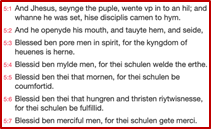What does Oxford university, a pandemic, and a professor being cancelled by speaking truth all have in common? Turn the clock back to the 14th century where the answer is found in John Wycliffe.[1] Wycliffe entered Oxford around 1345, but the Black Death (bubonic plague) delayed the completion of his doctorate until 1372. Regardless, he helped build its stellar reputation by his bold and outspoken scholarly teaching. His clear sermons, lectures and writings not only gained him extensive popularity, but also shaped Middle English dialect. But when he spoke his mind to Roman Catholicism's (RC) odious errors, that's when he lost his job.
answer is found in John Wycliffe.[1] Wycliffe entered Oxford around 1345, but the Black Death (bubonic plague) delayed the completion of his doctorate until 1372. Regardless, he helped build its stellar reputation by his bold and outspoken scholarly teaching. His clear sermons, lectures and writings not only gained him extensive popularity, but also shaped Middle English dialect. But when he spoke his mind to Roman Catholicism's (RC) odious errors, that's when he lost his job.
For instance, when the RC church demanded England pay taxes, Wycliffe advised his lord, John of Gaunt, to tell Rome to go pound sand (well, OK, not exactly but that's how the Pontiff took it). He reasoned the church was wealthy enough, and ought to divest all church property. Christians ought to embrace poverty as the Apostles did, and if anyone was to keep the taxes, it should be the local authorities. At his hearing that ensued, Wycliffe asserted the pope and the church were second in authority to Scripture. Not exactly a smooth politician. He was officially condemned in 1377 by Pope Gregory XI. His writings were burned. He was stripped of his position at Oxford, forbidden to disseminate his views, and fell under house arrest.[2] It backfired, as this gave Wycliffe even more time to devote to his writings. He sharpened his attacks on the Pope and RC traditions with the publication of several more books.
Wycliffe spearheaded an effort to translate the Bible into English for all Christians to read. The RC church bitterly opposed it: "By this translation, the Scriptures have become vulgar, and they are more available to lay, and even to women who can read, than they were to learned scholars, who have a high intelligence. So the pearl of the gospel is scattered and trodden underfoot by swine. Wycliffe replied, Englishmen learn Christ's law best in English. Moses heard God's law in his own tongue; so did Christ's apostles."
In addition to refuting the RC church's authority, Wycliff "wrote against the doctrine of transubstantiation: "The bread while becoming by virtue of Christ's words the body of Christ does not cease to be bread." He challenged indulgences: "It is plain to me that our prelates in granting indulgences do commonly blaspheme the wisdom of God." He repudiated the confessional: "Private confession â°¦ was not ordered by Christ and was not used by the apostles." He reiterated the biblical teaching on faith: "Trust wholly in Christ; rely altogether on His sufferings; beware of seeking to be justified in any other way than by His righteousness."
His work with other scholars produced the first complete English Bible (right, excerpt of Matt.ch.5). [3] An improved second edition of 1388 was published after W ycliffe died of a stroke in Dec. 1384. So great was his impact that 31 years later, the Council of Constance declared him a heretic, and in 1428 they exhumed his corpse, burned it, and cast his ashes into the River Swift. A later historian noted, "Thus the brook hath conveyed his ashes into Avon; Avon into Severn; Severn into the narrow seas; and they into the main ocean. And thus the ashes of Wycliffe are the emblem of his doctrine which now is dispersed the world over." [4] One of Wycliffe's quotes was used by Abraham Lincoln: This Bible is for the government of the people, by the people, and for the people. [5] Perhaps Lincoln considered Wycliffe's demise and modified it to suit.
ycliffe died of a stroke in Dec. 1384. So great was his impact that 31 years later, the Council of Constance declared him a heretic, and in 1428 they exhumed his corpse, burned it, and cast his ashes into the River Swift. A later historian noted, "Thus the brook hath conveyed his ashes into Avon; Avon into Severn; Severn into the narrow seas; and they into the main ocean. And thus the ashes of Wycliffe are the emblem of his doctrine which now is dispersed the world over." [4] One of Wycliffe's quotes was used by Abraham Lincoln: This Bible is for the government of the people, by the people, and for the people. [5] Perhaps Lincoln considered Wycliffe's demise and modified it to suit.
[1] Summary pix from Slideshare.net.
[2] Source: Curtis, Lang and Petersen, The 100 Most Important Events In Christian History, Fleming Revel publications, 1991, pg. 86-87.
[4] Quotes in para. 3-5, from from Christianity Today.
Like this? Consider sharing it to Facebook by clicking the linked icon below.
